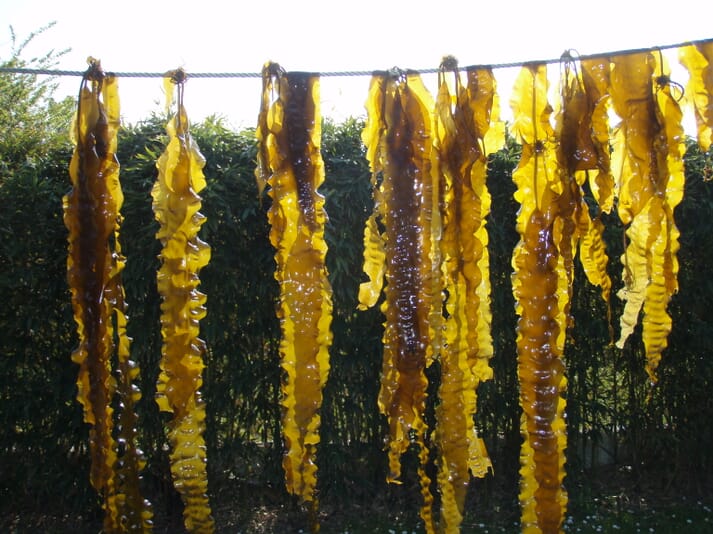Results from an innovative European seaweed research project have laid the foundations to strengthen Europe's seaweed cultivation and biorefining industry.
by The Fish Site
24 August 2021
Funded by the EU Horizon 2020 program, GENIALG has developed innovative solutions to help production of seaweed biomass in Europe to become more economically and environmentally sustainable.

Drying seaweed© Dr Javier Cremades
“GENIALG has approached all legal, financial, environmental, socio-economic and technical aspects to facilitate the development of the European seaweed sector, from seaweed farming to the production of molecules of interest to the seaweed industry. By combining a trans-sector partnership with an integrated and sustainable approach, GENIALG aimed to meet the market needs in the fields of health, nutrition, cosmetics and agriculture. New technologies, methods and tools (genomics and post-genomics) have been developed – eg for seeding, harvesting, rearing, cultivating and storing seaweed, as well as for pre-processing, fractionation, extraction and purification of the biomolecules within the seaweeds,” Philippe Potin, project coordinator, reflects.
GENIALG has tackled key challenges facing the industry, including how to reduce costs, scale-up production and improve the quality and refinement of seaweed biomass into multiple value-added products.
Since its initiation in 2017, GENIALG has made significant contributions to the European seaweed research and industry landscape. Key outputs include:
“GENIALG has approached all legal, financial, environmental, socio-economic and technical aspects to facilitate the development of the European seaweed sector, from seaweed farming to the production of molecules of interest to the seaweed industry. By combining a trans-sector partnership with an integrated and sustainable approach, GENIALG aimed to meet the market needs in the fields of health, nutrition, cosmetics and agriculture. New technologies, methods and tools (genomics and post-genomics) have been developed – eg for seeding, harvesting, rearing, cultivating and storing seaweed, as well as for pre-processing, fractionation, extraction and purification of the biomolecules within the seaweeds,” Philippe Potin, project coordinator, reflects.
GENIALG has tackled key challenges facing the industry, including how to reduce costs, scale-up production and improve the quality and refinement of seaweed biomass into multiple value-added products.
Since its initiation in 2017, GENIALG has made significant contributions to the European seaweed research and industry landscape. Key outputs include:
Demonstrating the techno-economic feasibility of cultivating land-based sea lettuce and of cultivating sugar kelp in the open sea.
Applying the first genome-wide approaches and a customised phenotyping platform for seaweed strain selection and improvement to improve understanding of seaweed genetics and physiological traits.
Creating new approaches for valorising new and existing products from seaweed compounds that have pharmaceutical applications. These include fucoxanthin from Saccharina and various fractions from Ulva which are used in animal and plant care and, in the near future, expected to have applications in human healthcare.
Developing novel marine enzymes and enzyme cocktails for seaweed fractionation.
Another key element of the project has been to improve access to reliable information about seaweed farming best practices and the innovations of seaweed biorefinery. It has done this though the creation of:
The GENIALG E-Learning Course on sustainable seaweed farming practices, which is freely available to students, current practitioners within the seaweed industry or anyone interested in entering the seaweed industry.
The GENIALG Manual on Best Practices for Seaweed Farming, which contains information on biocontainment and management of pests and pathogens.
The GENIALG Biorefinery Manual, which explains the benefits and sustainability of seaweed biorefinery processes.
Applying the first genome-wide approaches and a customised phenotyping platform for seaweed strain selection and improvement to improve understanding of seaweed genetics and physiological traits.
Creating new approaches for valorising new and existing products from seaweed compounds that have pharmaceutical applications. These include fucoxanthin from Saccharina and various fractions from Ulva which are used in animal and plant care and, in the near future, expected to have applications in human healthcare.
Developing novel marine enzymes and enzyme cocktails for seaweed fractionation.
Another key element of the project has been to improve access to reliable information about seaweed farming best practices and the innovations of seaweed biorefinery. It has done this though the creation of:
The GENIALG E-Learning Course on sustainable seaweed farming practices, which is freely available to students, current practitioners within the seaweed industry or anyone interested in entering the seaweed industry.
The GENIALG Manual on Best Practices for Seaweed Farming, which contains information on biocontainment and management of pests and pathogens.
The GENIALG Biorefinery Manual, which explains the benefits and sustainability of seaweed biorefinery processes.
Our promise:
Circular & Restorative
Through innovation and sustainable sourcing we will collaborate with industry partners and redefine traditional aquaculture feed ingredients. By 2030 50% of our raw materials will be Circular & Restorative
Circular & Restorative
Through innovation and sustainable sourcing we will collaborate with industry partners and redefine traditional aquaculture feed ingredients. By 2030 50% of our raw materials will be Circular & Restorative
READ OUR SUSTAINABILITY REPORTGiant Kelp Forest,
Tasmania, Australia
Tasmania, Australia
No comments:
Post a Comment